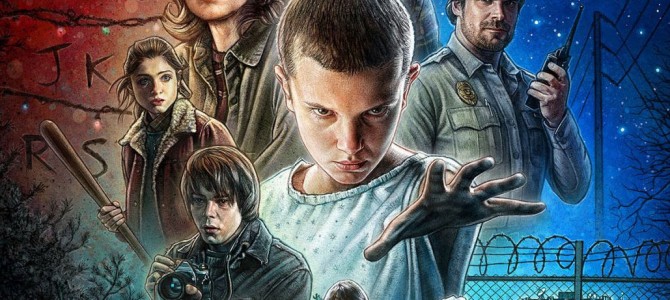
Warning: Some spoilers ahead.
Have you pined for the simpler times of the 1980s, when kids were on bikes past dark and we didn’t all spend our time chained to smartphones? Life was safer and more wholesome … except when it wasn’t.
“Stranger Things” seamlessly melds our nostalgia for days past with the weird and unexpected. More than that, it examines the relationship between the local police, who are part of the fictional community of Hawkins, and state and federal officials, who are more concerned with their agenda than actual people. “Stranger Things” might be rooted in the ‘80s, but it’s timely and current.
An Undercurrent of Distrust in the Authorities
Art reflects culture. Arguably, media is the art of our day, and this media thrusts forward questions about childhood, technology, law enforcement, and families. Familiar archetypes lead the show, but there’s far more to be had than stereotypes in “Stranger Things.” This depth is being discussed, and rightly so. Rare News has mused on the throwbacks to “The X-Files” and the dichotomy between governmental cover-ups and officers trying to do right by people.
Yet where “Stranger Things” really does Fox Mulder proud is its broadly libertarian undercurrent. All the (human) bad guys are part of a government conspiracy, and in “Stranger Things,” the most mundane federal bureaucracy can be deadly (in real life, too). But what really confirms that the government agents are evil is that their primary characteristic is a deep disregard for human life, especially when it gets in their way.
Subhuman monsters, psychokinetic children, and the ‘80s aside, “Stranger Things” is actually about us. We don’t trust the government, and government officials give us ample reason for this distrust. Our concerns are for our families, for the safety of our communities.
We are the mothers and fathers of this show. We are the local police, willing to bend the law and exceed our job descriptions in order to actually protect and serve. Nebulous agencies making policies about people and places they’ll never actually interact with face to face, serving their internal goals instead of a greater good, contrast sharply with people who are part of the community and care more about individual lives and needs.
A Commentary on Families
These characters and their relationships are worth examining. The most developed family in the show is the Byers family, with much of the plot of the season focusing on the disappearance of Will Byers, the baby of the family at 12 years old. We see him rarely after the first few moments of the show’s opening, but we become intimately familiar with his brother Jonathan and his mother Joyce.
Jonathan is the ‘80s loner and outsider we’re all familiar with: looking at cliques from the outside, pining after the girlfriend of a popular athlete, and studying the world around him through the wide-angled lens of his vintage camera. Less typical is that he’s also the man of the house despite still being in his teens, taking care of his scattered and anxious mother and putting his deadbeat father in his place.
His mother Joyce is timeless, a harried single mother struggling to pay the bills in a dead-end job yet still able to keep up with her sons’ hobbies as well as their dreams. Her hard-drinking ex reappears long enough to try to cash in on the tragedy unfolding in their lives, but not long enough to actually help anyone.
The other extreme is found in the Wheelers. Dad works hard, although we don’t know where, nor does it seem to matter. Karen, the mother, constantly reminds her children that they can talk to her and trust her, yet neither her teen daughter nor 12-year-old son seem to be able to confide in her. Their home is clean, their meals are ‘80s perfection (meatloaf!) and yet their relationships are shallower than those in the dumpy home of the Byers.
When Nancy has sex with her boyfriend, her mother provides no guidance or support. After her son Mike’s best friend goes missing while on the way home from her house, she struggles to find the words or actions to comfort him. She misses that a mysterious girl, an escapee from the hidden laboratory in the woods, has moved into her basement after her son and his friends find El (short for Eleven) wandering the woods in the rain, alone at night.
Jim Hopper, the sheriff, is his own dysfunctional family unit. Alone after the death of his daughter, the disintegration of his marriage, and his string of one-night stands, he drinks and lives hard. We infer that he went from a city to the small town of the show after losing his family, seeking quiet and lower crime and heartbreak, only to be thrust into the middle of a conflict between his desire to provide good policing for a family missing their son and the crooked higher government and their shadowy lab.
He is initially inept and not overly likeable, then shifts into the kind of man and officer the town really needs. This change in Hopper is rapid, and as he suddenly understands the disappearance in his town may not be as simple as he first thought he also begins to face his personal grief.
Full Circle from Families Back to Authorities
The final focal family of the show is the deeply disturbing: Dr. Brenner, Eleven, the lab staff, and her biological mother. Her mother is a plot point, a device meant to provide some explanation for the telekinesis and telepathy of the daughter with vague talk of CIA experiments like MKUltra. More visible is Dr. Brenner, who despite being called Papa by El is not at all paternal.
He’s cold and calculating, willing to hurt her, isolate her, and use her to further experiments and get his own personal satisfaction. He’s the villain, a monster in human clothes, unconcerned with the loss of life in his employees, the destruction in the community, and the pain of a little girl. Brenner, whether currently employed by the government or not, is politically well-connected, and reminds us how clearly different the rules are for the elite. Law doesn’t apply when it is inconvenient, because the end always justifies the means. And that end is power.
The plot of “Stranger Things” is simple, but it’s deep. Missing townspeople, a monster loosed from a shadowy lab, a psychic girl connecting the two, and the struggles of everyone to make sense of the impossible are the veneer. The substance is the conflict of us versus them. The show uses a decade-long past to examine the disaffection and distrust that is so prevalent now. Hearing that some higher official is handling things doesn’t comfort the characters in this show, and it similarly ignites concern in us now. Instead of trusting that the authorities care about small towns and the lives of people, “Stranger Things” wraps layers of governmental cover-ups upon each other into a snowball encompassing so many deceptions that untangling them is akin to working a Gordian knot.
“Stranger Things” pits those who seek the truth against those who seek power, and local communities against faraway officials using them for shadowy ends. As we look at the honesty (or lack thereof) of those who are seeking power in our real government, it’s a stark reminder that power corrupts, the truth can be the enemy, and it’s foolish to trust those who think they are above the law.









